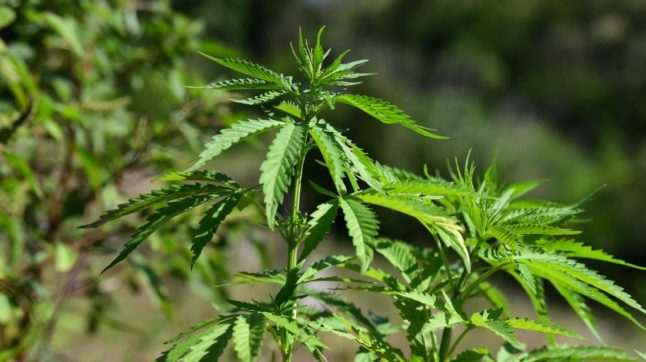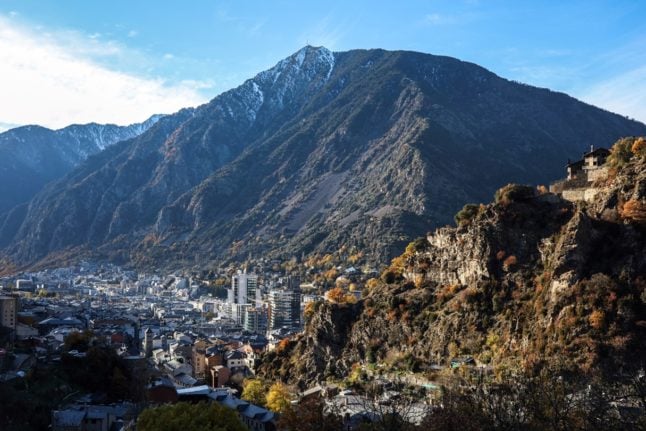France has some of the toughest cannabis laws in Europe; there is no distinction between possession for use or possession for supply, and it remains outlawed for medicinal use – although a medical trial is currently under way.
Officially, French law calls for a €3,750 fine and/or up to a year in prison for use or possession of narcotics. There is little distinction between “hard” and “soft” drugs – though on-the-spot fines of between €150 and €200 for minor offences of cannabis possession have been enforced since January 2018.
President Emmanuel Macron has announced that he wants to introduce an on-the-spot payment option for cannabis fines, but there are no indications of further legal changes.
Heavy use
Despite these efforts, cannabis consumption in France is the highest in Europe, with an estimated 5 million annual users and 900,000 daily smokers. In 2016, 41 percent of French people aged 15 to 64 said that they had used the drug at least once – compared to the European average of 18.9 percent.
A previous parliamentary report, published in January 2018, acknowledged that France’s drug policies were “inefficient” as well as “time-consuming for police and magistrates”.
The interior ministry at the time estimated the number of police working hours devoted to such offences in 2016 at more than 1 million – the equivalent of 600 people working full time, it said.
It was at this time that the government announced police would begin handing out on-the-spot fines for cannabis possession.
The latest studies
In 2021, a year-long parliamentary fact-finding mission concluded with MPs calling for the legalisation of the drug.
The report – compiled over a year and featuring consultations with doctors, police officers, legal experts, academics and the public – said that legalising the drug would ‘regain control’ from traffickers and protect young people. It points – again – to what it describes as the ‘failure’ of current hard-line policies.
“The state helplessly assists the trivialisation of cannabis among young people and the deterioration of security [despite] a French repressive policy which is costly and relies excessively on the police,” it said.
The budget allocated to the police, gendarmerie and customs for the fight against illegal drugs almost doubled between 2012 and 2018 and currently stands at €1.08 billion annually, the MPs noted.
More than half of that amount – €568 million – is spent fighting cannabis trafficking and use, said Caroline Janvier, an MP from Macron’s LREM party who sits on the cross-party parliamentary committee on cannabis, ahead of the launch public consultation stage of the study earlier this year.
Its chairman, Robin Reda of the right-wing Les Républicains party, said at the time: “Cannabis use is so widespread in society; we have to respond to that at a political level.
“No one should be happy with our current policy when this repressive stance is clearly not working.”
Public opinion
A widespread survey in 2021 found that more than 80 percent of people were in favour of easing France’s drugs laws.
In six weeks, 253,194 people took part in an online citizen consultation on recreational cannabis.
Le Monde reported that 80.8 percent of respondents agreed with allowing the consumption and production of cannabis in a framework governed by law; 13.8 percent said they supported decriminalising the drug completely; and 4.6 percent said they wanted stronger sanctions, while 0.8 percent said current rules should be maintained.
This backs the finding from other surveys, including an informal poll of mayors within the greater Paris region, which found that half of them wanted it decriminalised.
Opposition
Despite the apparently overwhelming public support, opposition remains strong in key circles – notably in the police and in Macron’s government.
Police union Alternative Police said: “Alternative Police asserts that this decriminalisation scheme corresponds to the one followed by the Netherlands since 1976, which now faces an increase in drug-traffickers’ criminality linked to the tolerance of cannabis sales for more than 40 years, and that legalisation will only accentuate the criminogenic situation with a proven increase in consumption.”
The union highlighted the murder of Sarah Halimi – her alleged killer will not face trial, after the Cour de Cassation, ruled he had been undergoing a “psychotic episode” at the time of the attack because of excessive cannabis use and was therefore not fit to stand trial.
READ ALSO Affaire Sarah Halimi – why the murder of a Jewish woman in Paris could be tried in an Israeli court
Alternative Police’s statement said: “The murderer of Sarah Halimi was under the influence of cannabis. Tomorrow, by legalising cannabis, are parliamentarians ready to assume the principle of the excuse of irresponsibility as it was invoked during the trial of this tragic case?”.
Interior Minister Gérald Darmanin, meanwhile, has been equally unequivocal in his opposition.
Légaliser le cannabis ? Non ❌ !
Il faut sortir de la naïveté, combattre la drogue et ne pas baisser les bras.Ma réponse au député Lambert👇 pic.twitter.com/eXcJU9yGTQ
— Gérald DARMANIN (@GDarmanin) May 4, 2021
He previously described cannabis as a hard drug ‘like heroin or cocaine’, and has repeatedly voiced his support for police in their ‘war on drugs’.
Ce soir, j’ai échangé avec ce policier pour lui témoigner tout mon soutien.
Nous ne reculerons pas dans la lutte menée contre la drogue. https://t.co/l3v5xF7YuH— Gérald DARMANIN (@GDarmanin) April 28, 2021
In September 2020, he said: “As interior minister and a politician I cannot tell parents who are fighting for their children to give up their drug addiction that we are going to legalise this shit – and yes, I am saying shit.”
Strong words, for sure, but ones that toe a common long-standing and successive government line. In 2019, then-Health Minister Agnès Buzyn said: “I’m against legalising cannabis. I’m currently waging a fierce campaign against smoking, so I’m not going to decriminalise marijuana, which has the same effects as cigarettes.”
And President Emmanuel Macron has ruled out legalising the drug while he is in office.
There are however some advocates in government – government spokesman and former neurologist Olivier Véran has long been an advocate of the legalisation of cannabis for medical use. While a backbench MP, he put forward an amendment to allow France to trial the drug for medical purposes.
Finance Minister Bruno Le Maire told BFM Politique in early 2018 that while he did not support the legalisation of cannabis, an overhaul of French drug laws was long overdue.
“’We must take a good hard look at where we have gone wrong … we have the harshest laws in Europe, yet the highest consumption rates.”
Medical use/CBD
In October 2020, the French government finally gave the go-ahead for two-year medical trials of cannabis, which were later extended.
You may have seen cannabidiol – or CBD – shops on French high streets, or online.
Cannabidiol is an oily, plant-based compound extracted from cannabis hemp. It is one of over 113 cannabinoids found in the cannabis plant.
Many advocate its use to ease chronic pain, inflammation, migraines, epilepsy, autoimmune diseases, depression, and anxiety.
CBD is not classed as a drug because it does not contain the active compound THC, which causes the ‘high’. France already produces some 40 percent of Europe’s hemp supply.
But the rules surrounding CBD in France are vague, at best. The European Court has ruled it can be sold in France – but it is illegal to grow hemp for the production of CBD here.
And shops selling CBD remain vulnerable to sudden administrative closures.



 Please whitelist us to continue reading.
Please whitelist us to continue reading.
Judging by what they have just voted for in the “Climate Bill” I would think most of the Government are already smoking it.